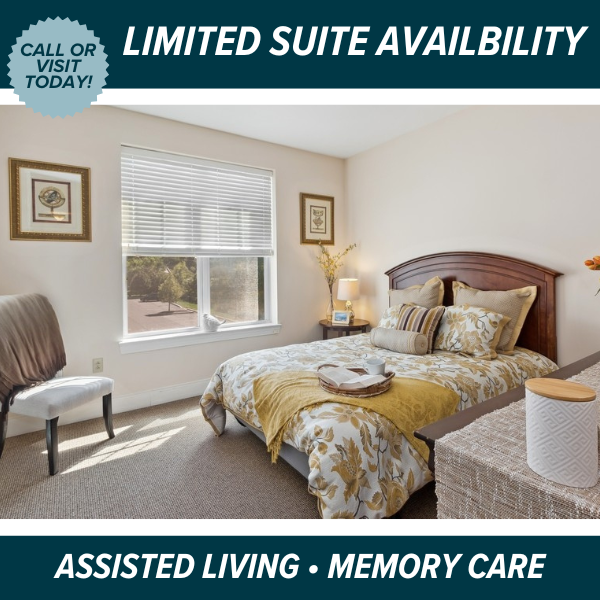When it comes to senior living, plenty of options exist, like assisted living and memory care. However, what if your family is looking for something more short-term? Does this kind of option exist, or is it only for long-term stays?
Short-term stays, also called respite care in some states, is an excellent option for many seniors. When burnout or recovery is involved, this lifestyle can be a relief for your family. In fact, some older adults even use a short-term stay as a way to test out a senior living community for themselves!
What Is Short-Term Care for Seniors?
Short-term care refers to temporary services designed to help older adults and caregivers alike. Caregiving can be rewarding, but that doesn’t mean it’s always the easiest. When you need to take a step back, breathe, and focus on yourself, short-term stays can step in to help.
This care option is customizable in most situations. Though the specific length of the stay depends on the community, short-term stays tend to last between a few days to a few weeks. Your loved one gains access to professional support, while you can reduce your responsibilities for a short time.
The Types of Short-Term Care Services
Short-term care encompasses different types of services. This varies significantly—every community is a little different in how they approach this care.
However, these are 4 of the most common types.
Respite Care
Respite care focuses primarily on family caregivers. Your loved one temporarily moves to a senior living community so they can gain access to all kinds of benefits. They’ll be able to enjoy all the amenities, care, and services the community offers.
Meanwhile, you’re able to focus on your own life. You can run errands, nap, pursue hobbies, and spend your time as you need. It’s a great way to focus on your own well-being without putting your loved one’s health at risk.
Rehabilitation Services
When seniors face surgery, illness, or an injury, rehabilitation programs help them regain strength and independence. These services focus on improving mobility, helping your loved one adapt to recent physical changes, and offering therapy services.
Transitional Care
Sometimes, a hospital discharge leaves an older adult needing assistance. This can be difficult to navigate at home—especially for newer caregivers.
With transitional respite care, your loved one can be supported by a team of professional caregivers. They’ll assist with medication management, wound care, and some additional medical support. This reduces the risk of long-term complications and helps your loved one recover.
Hospice Care
For older adults with complex, late-stage situations, hospice care stands out. This care focuses on comfort and emotional support, for both the patient in question and their loved ones.
The Benefits of Short-Term Care
Short-term care offers a wide range of advantages, both for seniors and their families.

Professional Support
The biggest benefit of short-term stays is the access provided to professional caregivers. Your loved one is constantly surrounded by a team that can help with their personal, medical, and emotional needs. This means a higher quality of life and support whenever it’s needed.
Personalized Care Plans
In a short-term stay, all services are tailored to meet specific health requirements, preferences, or recovery goals. This level of personalized care means your loved one can maintain their routine during their temporary stay.
Social Opportunities
Staying connected is a core part of boosted well-being. In short-term care, the community introduces residents to group activities, friendly caregivers, and all kinds of engaging events. This brings socialization to your loved one during their stay.
Relief for Family Caregivers
Caregiving poses its own range of challenges. Balancing another person’s needs alongside your own can quickly lead to scheduling conflicts. Eventually, caregivers may reach a point where they put their own needs aside, and this can quickly lead to burnout.
This is where short-term stays shine. It gives caregivers the chance to step back and focus on themselves, without worrying about risking their loved one’s well-being.
How to Tell If It’s Time to Try Respite Care
Recognizing when you need help is essential. The early signs of burnout can be subtle, but they also indicate you’re taking on too much at once and need a break.
Some signs it’s time to try respite care include:
- Feeling constantly exhausted, even after sleeping.
- Increased irritability or frustration with loved ones.
- Difficulty concentrating or making decisions.
- Neglecting personal health and well-being.
- Loss of interest in activities you once enjoyed.
If these sound familiar, don’t ignore them. Burnout can quickly lead to long-term health problems, and it can even put your loved one’s well-being at risk.
Come Try Short-Term Care
Short-term care gives older adults access to temporary help when it’s needed most. Whether your loved one is looking to recover, try senior living, or give you the break you deserve, a short-term stay can be incredible—for both of you.
That’s why our team at The Bridges at Warwick is ready to help your family. We offer short-term care services tailored to your loved one’s unique needs. We’re ready to help your loved one on their journey, so contact us today and schedule your visit!









